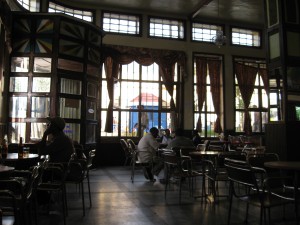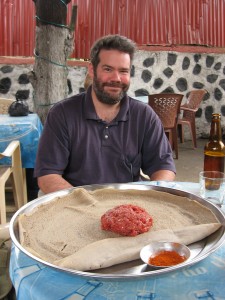 By the time we get out of the airlines office, we’ve decided that it’s going to be a drinking day. We walk down the hectic Gondar streets. Men sell wooden replica cigarettes, so other men can ease their nicotine fits during Ramadan fasting. Tuktuks fly down the road, every driver instinctively calls to us.
By the time we get out of the airlines office, we’ve decided that it’s going to be a drinking day. We walk down the hectic Gondar streets. Men sell wooden replica cigarettes, so other men can ease their nicotine fits during Ramadan fasting. Tuktuks fly down the road, every driver instinctively calls to us.
Gondar’s center is filled with a variety of shops with no discernible theme. One has a shelf of plumbing supplies and another shelf of fabrics. There are no shops which sell food and an oddly large ratio of barber shops. There is an internet café with no computers, a looming post office. The people crowd along the sidewalks and rush towards nothing in particular.
We find a café on the corner of the main intersection: The Hotel Ethiopia. The high ceilings and mirrored walls evoke a nostalgia for mid-60s Cuba Mark instantly terms the place Greeneland because it embodies the cafés and dens present in Graham Greene novels.
We sit in the corner on padded chairs and a gap-toothed ebony goddess approaches with a wide smile conveying absolute terror. We order two beers and two Araki and she runs away in a fit of the giggles. Her boss comes over and speaks to us in English, we repeat the order and a moment later are drinking at faranji prices.
Mark raises his glass. “To?”
“To not getting on that fucking bus.”
We drink.
It’s already been a long day and it’s only noon.
The day started at 5 am with a tuktuk ride to the bus station. The plan was simple: a bus from Gondar to Gashena, then hitch a minibus ride to Lalibela. Total trip time 10-12 hours.
We arrived at the bus station at 5:15. If you have ever seen pictures of the last chopper leaving the American embassy in Saigon in 1975, or if you have ever shopped in New Jersey on Black Friday, then you might have some idea what this bus station was like. Thousands of people were banging on the gates of the station, hopeful for a bus ticket. The place rocked with noise. The ticket sellers stood inside shouting back. People circled us and glared at us and our bags with no subtlety.
When Mark and I got inside, we carried our ticket to the bus and got on. We had actual seat numbers (30 and 31), which had given us hope that the bus was a real bus and not the horror show in a tuna can we’d experienced from Harar. We got on the bus and our stomachs dropped as we looked at the roughly 150 people cramming themselves into every inch of a 42-seat bus. We forced our way down the aisle, the insane racket outside of the bus slightly louder than the one inside of the bus. I turned to Mark, who said, “Fuck it. We’re flying.” And we bolted through the back door. As we went, I am sure that I noted seats 30 and 31 hosting a family of six and three chickens.
Truth be told, as we stormed through the mayhem of people and out of the bus station, we knew it was going to be a drinking day.
Designating a drinking day in a place like Ethiopia is not a task that is taken lightly. A drinking day should be scheduled. On a trip like this one needs to keep their wits and head about them. Moreover, there are long days of uncomfortable and often involved travel and those are undertaken with terrible misery if dealing with a hangover. So drinking heavily is usually not recommended.
Therefore a drinking day is usually scheduled in a city or town that offers a relative degree of comfort and peace of mind. Furthermore, it should be set when the next day is free of commitment and so can be spent in the grips of a thronging headache and stomach discomfort.
That all said, sometimes circumstances call for an impromptu drinking day. Like today.
After several prelunch beers and shots at Hotel Ethiopia, we start responding to the eye flirtations that the waitresses are sending our way. It’s at this time that the owner, a grumbly bald New York cabdriver, decides that he will be our only conduit to alcohol. Our fun gone, we pack up and move to our hotel bar.
At the hotel, we walk past the two guards who saw us off that morning, waving their rifles to us as we stepped into our tuktuk. They wave us back now, grin at our tipsiness. We sit at the bar. The bartender here is a very nice looking young man. He’s got the chiseled cheekbones that seem to be indigenous to Northwestern Ethiopia. He is friendly and attentive and dashes off to bring us a bottle of local honey wine, tej.
Tej is a brownish yellow, and is brought to us in a sticky one liter water bottle. There are two. We open them, pour out two glasses. I raise mine and say,
Mark says, “To eating raw meat and still being alive.”
We drink.
After leaving the bus station this morning, we headed through a maze of muddy streets and got lost on our way back to the hotel. We decided to salvage the day by hitting a restaurant where we will first experience kitfo.
Kitfo is essentially Ethiopian steak tartar, raw beef mixed with butter. I have had tartar in Prague and even then knew there was a chance of getting violently ill. In the muddy back streets of Gondar, eating a pile of raw meat just seems like the opening scene in a movie about the outbreak of a global epidemic.
Leaving a back streets restaurant in Ethiopia after eating a pile of raw meat harbors the same sheepish feeling one might have after leaving an orgy in South Africa. It was certainly fun and exciting, but there could be some serious consequences soon. This feeling was not cooled after seeing the restaurant’s bathroom and the chef walk out of it.
From now on, our day of drinking is reasoned as a necessary antiseptic defense against the battalions of bacteria and miniature beings flourishing in our systems. And if we can’t kill the buggers with booze, at the very least we can get them drunk so they’ll be more lethargic. Sounds stupid, but rationalizing alcohol today is a very easy notion.
The next bar is outside. There are lights strung up between trees which stand above round wooden tables in hard-packed dirt. The trees’ roots boggle up through the tables’ legs. There are a few other tables of people drinking and music coming from a window lined with bottles. A twelve-year-old boy appears in the window and Mark orders two drinks from him. The boy nods and disappears and a twelve-year-old girl brings his drinks. They stare at us in terror.
It’s dark now and tomorrow we’re going to be hungover and possibly dealing with the effects of raw meat in our systems. Mark comes back with the drinks and we have to cheers once more before we both pass out to the tune of Gondar’s animals.
“To…” I say.
“To a day of drinking in Gondar. How many people can say that?”
Tomorrow will be a pain, but that toast is true enough to make me forget about it for the moment.
We drink.

